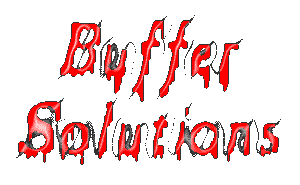
 |
Okay, we now know how to determine the pH of a solution after a given amount of acid or base has been added, but what do we do if we want to prevent a strong acid or base from changing the pH of a solution? Well, we could add, say, a solution of a weak acid and its salt or a weak base and its salt. This solution, known in some elitist circles as a buffer, aids a solution in resisting a change in pH. So how does it work? Well, let's look at an example. |
|
Let's say Dr. Evil, for reasons that will remain unknown to the world at large, decides to wreak havoc on the population of Citytown, USA by adding HCl to the water and poisoning the innocent citizens. So what can we, the shagadelic heroes, do to prevent this most heinous badass from poisoning the water? |
|
Well, what the hell, why don't we throw some acetic acid and sodium acetate (HOAc and NaOAc, respectively) into the reservoir? When you add this crazy pair to a solution, the NaOAc dissociates completely, and you end up with HOAc and OAc¯ in solution. So how does this save the fair citizens of Citytown? Well, when Dr. Evil tries to commit his dastardly deed by adding a dash of HCl to the reservoir, the OAc¯ will combine with the H+ that is deposited in the solution, forming HOAc. And, because HOAc is such a weak acid, it will hardly dissociate at all, absorbing (or "buffering," if you're an elitist Princeton snob) the H+, and preventing the pH from changing appreciably. |
|
What's that, you say? That's incredible? Well, you're right! And we hope your wonder shows through when you have to deal with this on the death test (that's right, we hope you didn't forget why you're here). And remember, this wonder of wonders doesn't just slice, dice, and make Julienne fries, it also works on bases as well! (we are such nerds) Yes, everything works the other way! For example, if you add NH3 and NH4Cl to a solution, you can add a dash of NaOH and it works the same way! |
|
Get it? Great! Then guess what we're gonna do now? Yep, you guessed it, we're gonna do a problem! |


|